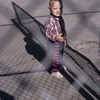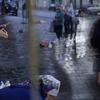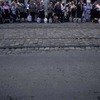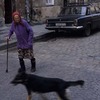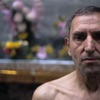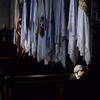Church Move Triggers Conflict
Ukraine's Eastern Rite Catholics on Sunday moved their church headquarters to Kiev amid protests from nationalists and objections from Orthodox believers whose leaders warn the move will further stoke inter-church tensions.
Cardinal Lubomur Husar conducted a ceremony for more than 1,000 believers and priests of the Ukrainian Greek Catholic Church after he was declared Metropolitan of Kiev and after a priest announced the church's move from the western city of Lviv.
While priests and believers sang hymns against the backdrop of a new church being built, several hundred nationalists and Orthodox believers gathered under red flags, carrying Orthodox icons, chanting through loudspeakers and partially drowning out Husar's words.
"Orthodox or death!'' some yelled as others jostled believers trying to attend the service. "You can kill us but you cannot take our faith from us!'' others yelled.
Sunday's move by the Ukrainian Greek Catholic Church - also known as Eastern Rite Catholics - is certain to upset the country's dominant Orthodox Church, which has accused Roman Catholics and others of trying to poach Orthodox believers.
About 10 percent of Ukraine's 48 million people are Eastern Rite Catholics, who follow Orthodox ritual but bear allegiance to the pope.
Ahead of the move, Orthodox officials in Moscow and Kiev had warned the Eastern Rite Catholics against setting up headquarters in the Ukrainian capital, which ancient Kievan rulers were baptized into Orthodoxy.
In a televised interview with the private TV5 channel Saturday, Husar said the decision to move the church's headquarters from Lviv to Kiev was not directed at anybody.
"We don't threaten anybody, we don't want to threaten any Orthodox Church," Husar said. "The headquarters of any religious community should be in the capital."
Under a white tent at the foot of a church under construction near the Dnipro River, a priest read the official announcement to about 1,000 believers and religious officials. After Husar was declared Metropolitan of Kiev, bells rang as he conducted the service, his golden dress and miter glittering in the bright sun.
Neither the head of the Russian Orthodox Church nor the head of the Ukrainian Orthodox Church loyal to Moscow comments on the move Sunday.
But last week, Russian Orthodox Patriarch Alexy II said relations with the Vatican would be affected. Ukrainian Orthodox Metropolitan Volodymyr appealed to Pope Benedict XVI to halt the transfer and the church's top body - the Holy Synod - warned of "unpredictable consequences."
Meanwhile, about 160 feet from the tent, protesters from various pro-Russian organizations held Orthodox icons and Ukrainian flags, chanting "Uniates, back to Lviv! Catholics, back to Rome!" and "Down with the Inquisition!" Riot police stood by.
"We consider it to be an expansion of the Vatican," Oleg Makryag, an Orthodox priest from Odessa, said about the church under construction. "They have representation in Lviv and therefore it is as if they are beginning their aggression."
Some protesters jostled priests and nuns attending the service. An elderly Orthodox woman in a blue head scarf pushed a priest, while several muscular young men, wearing shirts reading "Kharkiv Kickboxing Club" tried to prevent some believers from entering.
"What bad manners to fight one other! There's one God," one elderly woman trying to attend the service yelled at the protesters.
The dispute comes against the backdrop of roiled religious relations involving the country's main denomination, Orthodox. Two breakaway Orthodox churches are refusing to recognize the authority of the Russian Orthodox Church in Moscow. Metropolitan Volodymyr remains loyal to Moscow.
Patriarch Filaret, who heads the breakaway Ukraine Orthodox Church Kiev Patriarchate, said in televised comments on Saturday that the move is ``the home business of the Greek Catholic Church."
Despite the protests and the symbolism of the move, many Kiev residents were unconcerned.
"It's all politics," said Tetiana Pysmenna, an artist. "One thing is faith, and quite another thing is religion; religion is politics, where every side seeks preference."
